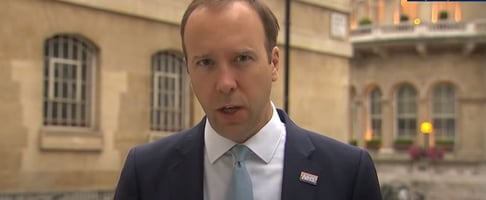Nothing says Christmas quite like our review of the year.
It’s around this time that I get asked to start compiling a list of the best and worst interviews of the year.
They are usually covered in our complimentary ‘review of the year’ webinar in December (keep an eye out for your invitation), where we explore the media training lessons that can be learnt from some high-profile examples.
And an interview I just stumbled across will almost certainly feature.
Katie Porter’s interview with CBS includes a threat to walk away and complaints about questions being “unnecessarily argumentative”.
Now, while Ms Porter may not be well known on this side of the Atlantic, she is the early frontrunner to become California's next governor.
But that may not be the case for much longer after this testy and embarrassing exchange.
What went wrong?
Well, it was a fairly innocuous question that led to Ms Porter’s downfall.
She was asked by Julie Watts, of CBS News California Investigates, what she would say to voters in the state who voted for President Trump.
“What do you say to the 40 per cent of California voters, who you’ll need in order to win, who voted for Trump?”, she was asked.
Ms Porter appeared to scoff at the premise of the question, saying: “How would I need them in order to win, ma’am?”
And things didn’t get any better as she was pressed on her need to appeal to Trump’s supporters.
At one point, she said: “I feel like this is unnecessarily argumentative. What is your question?"
She also came perilously close to walking out of the interview, saying: “I don’t want to keep doing this. I’m going to call it.”
If that wasn’t enough frustration, she also complained about the journalist asking follow-up questions, saying: “I want to have a pleasant, positive conversation.
“If every question you’re going to make up a follow-up question, then we’re never going to get there, and we are just going to circle around."
Katie Porter, the front runner to be the next Governor of California, tries to leave an interview after getting frustrated w/ @juliewattsTV questions pic.twitter.com/mTzZURG86K
— Alex Thompson (@AlexThomp) October 8, 2025
It feels rude, arrogant, and dismissive, doesn’t it?
We should note that despite appearing at one point to try to remove her microphone, Ms Porter did not leave the interview early.
But it is the three-minute clip of her getting frustrated that has been shared on social media and grabbed the attention of the public and journalists. Not the rest of the 20-minute exchange.
Here’s some of the headlines it generated.
Unwanted attention
Not only did the interview go viral and dominate the news cycle, but it also dredged up episodes from the past that may question Ms Porter’s temperament.
A video, reportedly shot in July 2021, resurfaced that shows the then congresswoman discussing electric vehicles with Jennifer Granholm, who was the US Energy Secretary at the time.
Exclusive from @melmason on Katie Porter, who berates a staffer and tells her to "get out of my fucking shot!" while recording a video with the Biden administration.
— Christopher Cadelago (@ccadelago) October 8, 2025
The video + story — scooped by @politico👇🏼https://t.co/WENFsRlkwC pic.twitter.com/47dQ3n6nWJ
In the footage, Ms Porter breaks off from speaking to Porter to shout at a staffer: “Get out of my f***ing shot... You also were in my shot before that. Stay out of my shot.”
Unsurprisingly, the videos have been seized upon by Ms Porter’s rivals in the race to be governor.
One said they reveal “anger control issues”. Another described her as a “weak, self-destructive candidate unfit to lead California.”
What media training lessons can you learn from this?
Well, the interview footage covers something we always highlight to our media skills training delegates – the importance of remaining composed.
Journalists will ask tough questions. But they are questions they believe their audience wants to be answered.
So, it is vital media spokespeople don’t get rattled or show anger and frustration at what they are being asked.
This can be tricky when you feel under pressure. Or if the difficult questions feel like they keep coming.
But composure helps you avoid negative headlines and social media posts, and the audience is more likely to be sympathetic.
Whereas, if you show annoyance, it is all people will remember from the interview.
And social media means clips of you getting angry can quickly travel far and wide.
Does that mean you can’t disagree with the premise of a question?
The short answer to that is no.
You can disagree with what a question suggests without showing frustration.
For example, instead of saying it sounds “unnecessarily argumentative”, Ms Porter could have said something like “That’s not how I see it. I think that…”.
Media interview preparation (and what to do if you are still caught off guard)
Preparation, which includes anticipating potentially difficult questions, is a vital part of avoiding getting angry and frustrated in media interviews.
Consider and work through awkward questions that might come up to reduce the chance of being caught off guard during interviews.
It builds confidence to handle them during the interview.
If you still get caught off-guard by an unwanted question, buy some thinking time.
A brief pause or a phrase like ‘that’s a good question’ – as long as it is used sparingly and calmly – can give you a few moments to gather your thoughts and plan how you can respond professionally.
And use the bridging technique to navigate your way to safer ground.
We’ve put some bridging phrases together in this blog to help you. But the key to good bridging is for spokespeople to develop words and phrases they feel comfortable with and that work for them.
Ms Porter has since said that she “could have handled things better” in the two videos.
She added: “I think I’m known as someone who’s able to handle tough questions, who’s willing to answer questions.”
The problem she faces is that the evidence of the CBS interview suggests otherwise.
And everyone has seen the footage.
I wonder how she will handle being included as one of our worst interviews of the year.
Media First are media and communications training specialists with nearly 40 years of experience.
We have a team of trainers, each with decades of experience working as journalists, presenters, communications coaches and media trainers.
Click here to find out more about our media training courses.






